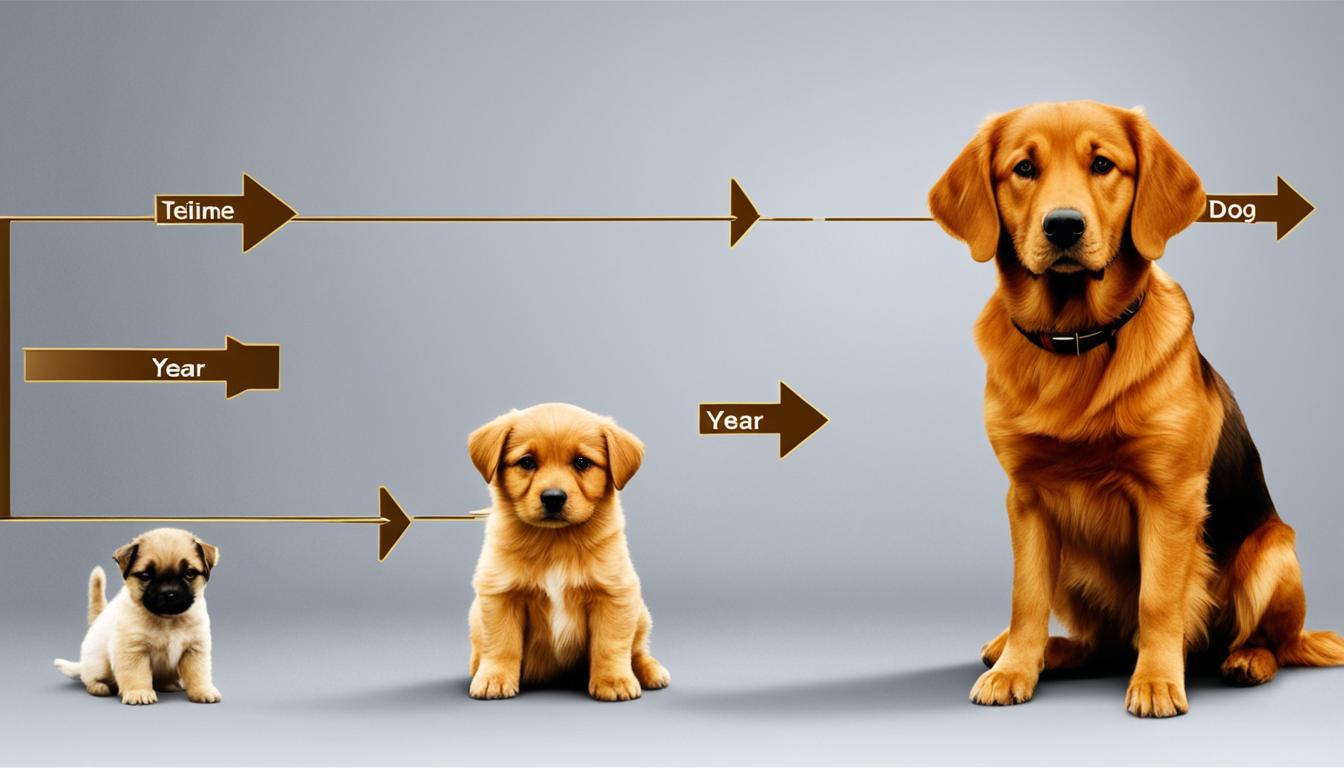🐾 Paw-some Partnership Alert! 🐾
As a pack of German Shepherd enthusiasts at MixGermanShepherd.com, we're always sniffing out the best products for our furry friends. Guess what? When you fetch something from Amazon through our links, we earn a little treat! 🦴
Dog years have long been a topic of interest for pet owners, as they seek to understand the true age of their furry friends in human years. In this comprehensive guide, we will explore the science behind dog years and provide you with the tools to calculate your dog’s age accurately. By the end of this article, you will have a deeper bond and understanding with your canine companion.
Key Takeaways:
- Understanding dog years helps determine your dog’s age in human years.
- Calculating dog years accurately requires considering factors such as breed, weight, and health.
- Size, genetics, diet, and exercise influence how quickly a dog ages.
- Regular vet check-ups, a balanced diet, and mental stimulation support a dog’s overall well-being.
- Researchers are working on anti-aging therapies to extend a dog’s lifespan.
What Are Dog Years and How Are They Calculated?
Dog years are a fascinating concept that allows us to estimate a dog’s age in relation to human years. While it is commonly believed that one dog year equals seven human years, the actual rate of canine aging is more complex and varies depending on several factors.
To accurately calculate your dog’s age in human years, you can use a dog age calculator. This tool takes into account various factors such as breed, weight, and overall health to provide a more precise estimation.
Understanding your dog’s age in human years can help you better comprehend their life stage and tailor their care accordingly. Let’s explore how dog years are calculated and why it’s important for your beloved companion.
Decoding the Dog Age Calculation
Contrary to the popular belief that one dog year equals seven human years, the rate at which dogs age varies based on their breed and size. Smaller breeds tend to live longer than larger breeds, and their aging process may be slightly slower.
A dog age calculator is a handy tool that considers these factors and provides a more accurate estimation of your dog’s age in human years. By inputting details such as breed, weight, and overall health, you can get a clearer picture of where your furry friend stands on the age spectrum.
For example, a small breed dog with good health might have a human age equivalent of three years when they’re actually two years old. On the other hand, a large breed dog might have a human age equivalent of five years when they’re only two years old.
| Dog Age | Small Breed Human Age Equivalent | Large Breed Human Age Equivalent |
|---|---|---|
| 1 | 15 | 12 |
| 2 | 24 | 22 |
| 3 | 28 | 31 |
Implications of Accurate Dog Age Calculation
Knowing your dog’s age in human years can add insight into their nutritional needs, exercise requirements, and overall health. Different life stages necessitate tailored care and age-appropriate activities.
For instance, a young dog may need a diet focused on growth and development, while an older dog may require food that supports joint health. By understanding your dog’s age, you can provide them with the best possible care at each stage of their life.
“Understanding your dog’s age in human years can help you tailor their care accordingly.”
The concept of dog years is important for every pet owner to grasp, as it allows them to bridge the gap in communication between humans and dogs. By using a dog age calculator and understanding the rate at which dogs age, you can strengthen your bond with your four-legged companion and ensure their well-being for years to come.
Factors That Affect Dog Aging
Several factors contribute to the aging process in dogs. The size of the dog plays a significant role, as smaller breeds tend to have longer lifespans compared to larger breeds. For example, a Chihuahua may live up to 20 years, while a Great Dane may only live between six to nine years. Additionally, genetics, diet, exercise, and overall health can influence how quickly a dog ages. It is essential to provide your dog with a balanced diet, regular exercise, and routine veterinary care to promote a healthy and prolonged life.
Proper nutrition is crucial for a dog’s well-being and longevity. Feeding a high-quality dog food that meets their specific nutritional needs is essential. Consult with your veterinarian to determine the best diet for your dog’s breed, age, and health condition. Additionally, avoid overfeeding, as excess weight can contribute to various health issues and shorten your dog’s lifespan.
Regular exercise is another key component that can slow down the aging process in dogs. Engaging in physical activities, such as daily walks, playtime, and interactive games, helps maintain muscle strength, mental stimulation, and overall body health. Exercise also helps prevent obesity, which can lead to various health complications and reduce your dog’s lifespan.
The Role of Genetics
Genetics also play a vital role in how dogs age. Just like in humans, certain genetic factors can predispose certain breeds to specific health conditions and age-related diseases. It’s important to be aware of any breed-specific health concerns and potential genetic predispositions that may affect your dog’s lifespan, such as hip dysplasia in larger breeds or certain heart conditions in smaller breeds. Consulting with a knowledgeable veterinarian can help you understand any genetic risks and take appropriate preventive measures.
Environmental and Lifestyle Factors
Environmental and lifestyle factors can also impact your dog’s aging process. Dogs living in a stressful or toxic environment may experience accelerated aging and a compromised immune system. On the other hand, dogs in a nurturing, low-stress environment with plenty of mental and physical stimulation tend to age more gracefully. Providing a safe and comfortable living space, along with regular social interaction and enrichment activities, can contribute to a longer and healthier life for your four-legged friend.
“Taking care of your dog’s physical and emotional well-being is crucial for promoting a longer and healthier life.”
| Factors | Affects on Aging |
|---|---|
| Size of the dog | Smaller breeds tend to live longer than larger breeds |
| Genetics | Specific breed-related health concerns and age-related diseases |
| Diet and nutrition | Proper nutrition for optimal health and weight management |
| Exercise | Regular physical activity for muscle strength and mental stimulation |
| Environment and lifestyle | Stress-free, stimulating living conditions for enhanced well-being |
The Science Behind Aging in Dogs
The process of aging in dogs is similar to that of humans. As dogs get older, they experience changes in their physical and cognitive abilities. Just like humans, dogs may develop age-related diseases such as arthritis, cognitive decline, and heart conditions. Understanding the science behind aging in dogs can help you identify potential health issues and take proactive measures to ensure your dog’s well-being. Regular veterinary check-ups, a nutritious diet, and mental stimulation are key factors in promoting a healthy and happy life for your canine companion.
Extending the Lifespan of Dogs

Researchers and scientists are constantly exploring ways to extend the lifespan of dogs and improve their overall quality of life. With advancements in veterinary medicine and research, new findings are emerging that offer hope for increasing the longevity of our beloved canine companions.
Longevity Drugs and Therapies
One area of focus in extending the lifespan of dogs is the development of longevity drugs and therapies that target the aging process. These interventions aim to slow down age-related diseases and promote healthier aging in dogs.
“The goal is to provide a proactive approach to managing age-related health concerns in dogs and potentially even extend their lifespan,” explains Dr. Emily Sullivan, a renowned veterinary researcher.
One example of a groundbreaking development is a longevity drug developed by a San Francisco-based biotech company. The drug has recently received conditional approval from the FDA, sparking excitement among pet owners and veterinarians alike.
Reducing Age-Related Diseases
The longevity drug aims to combat age-related diseases that often afflict large breed dogs, such as arthritis, heart conditions, and cognitive decline. By targeting these diseases, the drug has the potential to extend the lifespan of dogs and improve their overall quality of life.
A Holistic Approach
While the development of longevity drugs and therapies is promising, it is important to remember that they are part of a holistic approach to promoting canine longevity. Providing a loving and nurturing environment, along with regular veterinary care, remains vital in ensuring a long and healthy life for dogs.
“It’s essential to prioritize the overall well-being of our canine companions. This includes a balanced diet, regular exercise, mental stimulation, and preventative veterinary care,” emphasizes Dr. Sarah Thompson, a leading expert in veterinary geriatrics.
Summary
As research in the field of anti-aging for dogs continues to advance, the potential to extend dogs’ lifespan and improve their overall well-being becomes increasingly promising. By incorporating developments in longevity drugs and therapies into a holistic care approach, pet owners can provide their furry friends with the best chance for a long and fulfilling life together.
Conclusion
Understanding dog years and the aging process in dogs is essential for all pet owners. By using a dog age calculator and considering factors such as breed, size, and overall health, you can accurately determine your dog’s age in human years. Remember that every dog is unique, and their lifespan can vary depending on various factors.
Stay informed about the latest advancements in anti-aging therapies for dogs to ensure your furry companion’s well-being. While researchers and scientists are continuously exploring ways to extend the lifespan of dogs, it is important to provide a loving and nurturing environment for your four-legged friend.
Regular veterinary check-ups, a balanced diet, and plenty of exercise are essential in promoting a long and healthy life for your dog. Showing them love, care, and attention will create a strong bond and ensure their happiness as they grow older. Together, you can navigate the journey of aging with grace and joy.
FAQ
How do I calculate my dog’s age in human years?
You can use a dog age calculator that takes into account factors such as breed, weight, and overall health to get a more accurate estimation of your dog’s age in human years.
Do all dogs age at the same rate?
No, the rate of aging in dogs varies depending on factors such as breed and size. Smaller breeds tend to have longer lifespans compared to larger breeds.
What factors contribute to the aging process in dogs?
The size of the dog, genetics, diet, exercise, and overall health are all factors that can influence how quickly a dog ages.
What age-related diseases do dogs commonly experience?
Dogs may develop age-related diseases such as arthritis, cognitive decline, and heart conditions as they get older.
Are there any advancements in extending the lifespan of dogs?
Yes, there are ongoing studies focusing on longevity drugs and therapies that aim to target the aging process in dogs and extend their lifespan.
